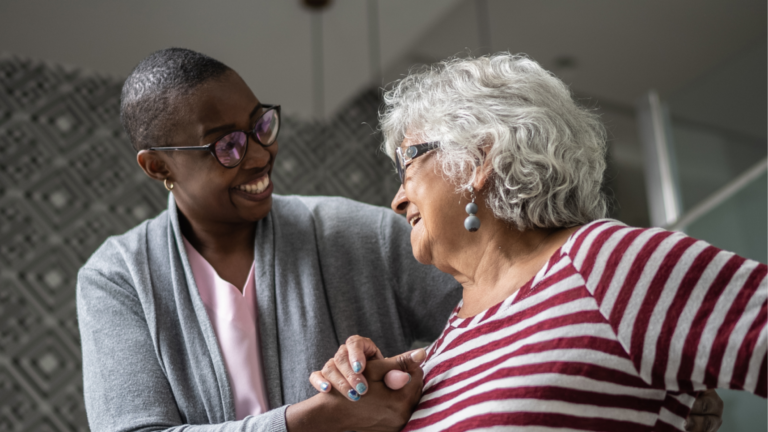
The DPP and Skinny Gene Project: A New Approach to Diabetes Prevention
Micheline Tocco
The Problem
The US is facing a worsening diabetes epidemic, impacting communities across the country. The disease affects 30.2 million adults aged 18 years or older, and approximately 95 percent of those people have type 2 diabetes, which we know is typically preventable with appropriate lifestyle changes. Today, diabetes costs the US over $245 billion a year, and until we confront this challenge as a system, the cost of diabetes- both monetary and human- will continue to rise. [1]
Diabetes disproportionately affects low-income populations where prevalence is almost double than affluent populations, and hospital admissions are 43% higher for low-income populations. Not only are low-income populations at a higher risk of being diagnosed with diabetes, but they are also at a disadvantage when it comes to managing their diabetes. [2]
While the prevalence of diabetes itself is frightening, in 2015, almost triple that amount- 84.1 million people- had pre-diabetes, its precursor condition. People with pre-diabetes – which is characterized by elevated blood glucose levels- are likely to develop type 2 diabetes within 10 years, unless they take steps to prevent or delay diabetes. [1] Because pre-diabetes can be reversed with an increase in physical activity and healthy diet, these individuals are ideal candidates for intervention programs and lifestyle changes. But without a clear plan to screen and refer patients to available services, underserved communities still face socio-economic barriers to access the very programs that can help them.
A Solution That Works
This year, Medicare has begun expanding the Diabetes Prevention Program (MDPP) after the success of the CDC’s test model. The program’s aim is to prevent individuals with pre-diabetes from developing type 2 diabetes through “practical training in long-term dietary change, increased physical activity and behavior change strategies for weight control” with the goal to achieve 5% weight loss.[3] This type of weight loss can result in drastic changes in a person’s overall health, reducing the incidence of diabetes overall and helping to manage comorbidities.[4]
Nationally Recognized DPP Programs like the Skinny Gene Project bring community support to individuals with pre-diabetes by providing nutrition counseling, fitness education, cooking classes and more to address all aspects of one’s lifestyle that can contribute to type 2 diabetes. [5]
The Skinny Gene Project is unique in that beyond the delivery of the CDC’s curriculum, they are blazing the trail for DPP by recognizing the need for partnerships across the community that ensure all who are eligible for DPP have the access and opportunity to participate. Among adults with pre-diabetes, only 11.6% know they have it, and Marlayna Bollinger, founder and Executive Director of Skinny Gene Project sees an opportunity for physicians to screen for pre-diabetes and refer patients to DPP services. [1]
To that end, Skinny Gene Project is laying down the infrastructure of a centralized model, through collaborative software provided by Unite Us, that brings together community stakeholders and caregivers in the San Diego area with the shared goal of lowering the incidence of type 2 diabetes. Participating physicians screen patients for pre-diabetes and use Unite Us to electronically refer interested patients to the Skinny Gene DPP Network. Skinny Gene connects each individual with a DPP Lifestyle Coach who provides weekly support. Care is integrated with real-time feedback on an individual’s status, illuminating where they are along the process. This model not only accelerates patient participation in the program, but it provides all stakeholders with shared visibility and communication to ensure prediabetic patients are receiving the support they need to keep them healthy. And it’s clear that they’re onto something: Skinny Gene Project achieved a five times increase in participant enrollment in 2017.
Marlayna Bollinger, founder and Executive Director of the Skinny Gene Project feels strongly that “DPP is an amazing program with the potential to help a lot of people, but it can be confusing for both participants and providers to navigate. Skinny Gene Project is looking big picture and we’re building a framework for a system that can work, which will set a standard for programs across the country as more and more states begin to offer Medicaid reimbursement for DPP.”
The Road Ahead
States like California, Minnesota, and Massachusetts are leading the way, as the first states to provide diabetes prevention programs as a Medicaid benefit. In California, $5 million has been designated for diabetes prevention programs across the state, with another $8 million expected to be matched by the federal government in the coming years. [6] With a huge increase in the number of people that are eligible to participate in DPP as a covered benefit under Medicare and Medicaid, DPP programs are challenged to keep up with the demand. Now more than ever, the need for us all to work together in a coordinated approach.
If you are participating or will participate in the DPP and you are looking for ways to connect with community providers through one platform fill out your information below for us to contact you.
References
[1] Centers for Disease Control and Prevention. National diabetes statistics report, 2017. www.cdc.gov/diabetes/pdfs/data/statistics/national-diabetes-statistics-report.pdf
[2] https://www.ncbi.nlm.nih.gov/pmc/articles/PMC1618393/
[3] https://innovation.cms.gov/initiatives/medicare-diabetes-prevention-program/
[4] http://care.diabetesjournals.org/content/38/6/1161
[5] http://www.skinnygeneproject.org/
[6] http://www.phadvocates.org/wp-content/uploads/2017/07/Medi-Cal-Coverage-of-DPP-2017.pdf
About Unite Us
Unite Us is the nation’s leading software company bringing sectors together to improve the health and well-being of communities. We drive the collaboration to identify, deliver, and pay for services that impact whole-person health. Through Unite Us’ national network and software, community-based organizations, government agencies, and healthcare organizations are all connected to better collaborate to meet the needs of the individuals in their communities.



